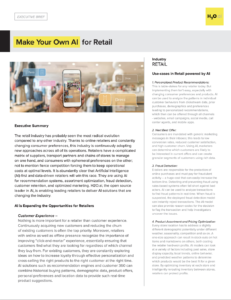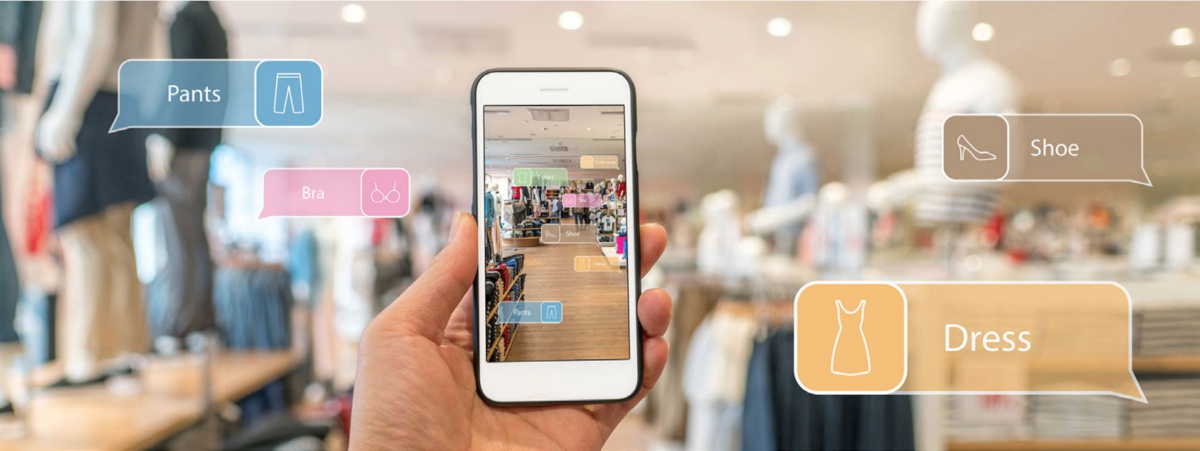Make Your Own AI for Retail
AI is Expanding the Opportunities for Retailers


Executive Summary
The retail industry has probably seen the most radical evolution compared to any other industry. Thanks to online retailers and constantly changing consumer preferences, this industry is continuously adopting new approaches across all of its operations. Retailers have a complicated matrix of suppliers, transport partners and chains of stores to manage on one hand, and consumers with ephemeral preferences on the other; not to mention fierce competition forcing them to keep operational costs at optimal levels. It is abundantly clear that Artificial Intelligence (AI)-first and data-driven retailers will win this race. They are using AI for recommendation systems, assortment optimization, fraud detection, customer retention, and optimized marketing. H2O.ai, the open source leader in AI, is enabling leading retailers to deliver AI solutions that are changing the industry.


AI is Expanding the Opportunities for Retailers
Customer Experience –
Nothing is more important for a retailer than customer experience. Continuously acquiring new customers and reducing the churn of existing customers is often the top priority. Moreover, retailers with online as well as offline presence recognize the importance of improving “click-and-mortar” experience, essentially ensuring that customers find what they are looking for regardless of which channel they buy from. For existing customers, they are constantly exploring ideas on how to increase loyalty through effective personalization and cross-selling the right products to the right customer at the right time. AI solutions such as recommendation engines and customer 360 can combine historical buying patterns, demographic data, product offers, personal preferences and location data to provide such real-time product suggestions.
Financial Safeguarding –
Fraudulent transactions can directly impact the bottom-line and tarnish the retailer’s reputation within no time, regardless of their brick-and-mortar stores or online presence. Fraud detection and prevention has to be real-time and accurate at the same time. Retailers need to protect the privacy of its customers while providing best-in-class shopping experience; this is a key tradeoff every retailer has to balance. AI-first retailers go beyond simply implementing rules-based alerts and are able to successfully deploy machine learning (ML) models that predict fraudulent credit card transactions in real-time based buying patterns, individual profiles and other such factors.
Operational Excellence –
Improving employee experience is as important for retailers as improving customer experience. AI-based intelligent assistants for call centers, augmenting warehouse workers with robots, and real-time alerts of product offers on point-of-sale or handheld devices that the instore salespeople use are some examples where an AI-first strategy can make an immediate impact on a retailer’s operations. In addition, a smart inventory management solution that makes just the right amount of products available in the right quantity in the desired timeframe can optimize the inventory cost.
Use-cases in Retail powered by AI
Why H2O.ai for Retail
H2O.ai offers an award-winning automatic machine learning platform in Driverless AI and has been recognized as an industry leader in the Forrester New WaveTM: Automation-Focused Machine Learning Solutions, Q2 2019. H2O, open source, is already being used by hundreds of thousands of data scientists and is deployed at over 18,000 organizations across nearly every industry.
H2O Driverless AI empowers data scientists, data engineers, mathematicians, statisticians and domain scientists to work on projects faster and more efficiently by using automation to accomplish tasks that can take months and can now be reduced to hours or minutes by delivering automatic feature engineering, model validation, model tuning, model selection and deployment, machine learning interpretability, timeseries, NLP, automatic pipeline generation for model scoring and automatic documentation with reason codes, and now bring your own recipes and model operations and administration.
The new innovations and capabilities will enable customers to accelerate their AI transformations in the Retail industry.
1. Personalized Product Recommendations:
This is table-stakes for any retailer today. But implementing them isn’t easy, especially with changing consumer preferences and products. AI can be used to analyze the patterns in individual customer behaviors from clickstream data, prior purchases, demographics and preferences leading to personalized recommendations, which then can be offered through all channels - websites, email campaigns, social media, call center agents, and mobile apps.
2. Next Best Offer:
Consumers are inundated with generic marketing messages in their inboxes; this leads to low conversion rates, reduced customer satisfaction, and high customer churn. Using AI, marketers can determine which customers are likely to be interested in current offers and can create granular segments of customers using rich data.
3. Fraud Detection:
E-tailers are responsible for the protection of online purchases and must pay for fraudulent activity – a huge cost that can easily increase the bottom-line. Detecting and preventing fraud using rules-based systems often fall short against bad actors. AI can be used to analyze transactions to find fraud patterns in real-time. When fraud is suspected, the deployed fraud detection model can instantly reject transactions. The AI model can also provide reason codes for the decision to flag the transaction and help investigators uncover the issues.
4. Product Assortment and Pricing Optimization:
Every store location has to address a slightly different demographic potentially under different weather, seasonality, competition and so on. A one-size approach can result in stock-outs on hot items and markdowns on others, both costing the retailer hard-won profits. AI models can look at a variety of factors including past sales, store display capacity, local trends, online behavior, and predicted weather patterns to determine which products would be the best fit for a given store. By optimizing inventory at each store and intelligently rerouting inventory between stores, retailers can protect profits.


Customer Case Studies
- Macy’s, a leading U.S.-based retailer
- Major U.S. department store chains
The data science team at Macy’s was under increasing demand by the business to build high-quality models quickly to help drive competitive advantage. The team realized that they would need to use a modeling platform rather than coding algorithms and creating models for production environments by hand. They decided to use H2O machine learning and could easily create ML models customer acquisition and retention, real-time product recommendations, and offer optimization without expanding the team.
The analytics, BI and data engineering teams at leading retailer store chains use H2O Driverless AI for a variety of use-cases including customer churn prediction, next best offer, and fraud prevention. H2O Driverless AI allows them to implement these use-cases in weeks instead of months without compromising on the scoring accuracy of the ML models.
Win with AI – Get Started Today
AI is critical to success in the retail industry. Driverless AI enables retailers to improve audience targeting, product recommendations, next best offer, fraud detection and pricing optimization.




